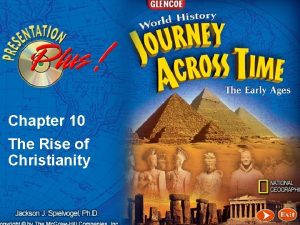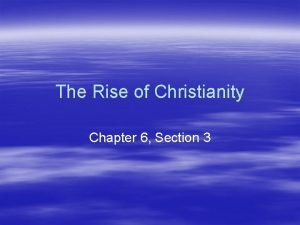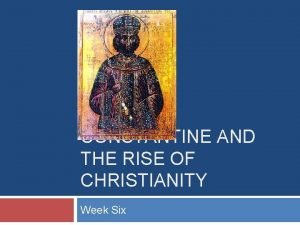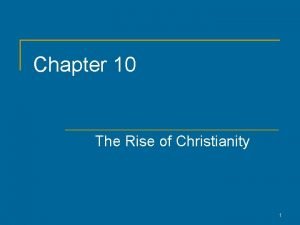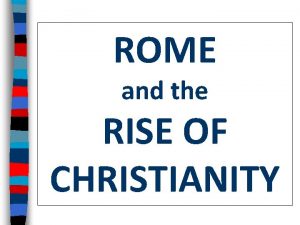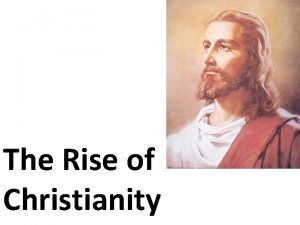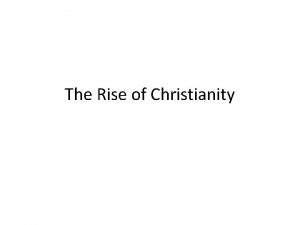The Rise of Christianity 6 4 I Christianity













- Slides: 13

The Rise of Christianity 6. 4

I. Christianity and Judaism A. Judaism in the Roman World n 63 BC Pompey conquered Judea o Jews unwilling to abandon their religion for polytheistic religion of Romans o To avoid trouble, Roman leaders allowed the Jews to practice their religion if: paid their tribute maintained civic order

B. Reactions to Roman Rule n Judaism: different branches w/ varying ideas regarding cooperating w/ Romans o Zealots Jews to rise up, drive out Romans, & re -establish the Kingdom of Israel Began to form pockets of armed resistance 66 -70 AD response to mass upraising Romans sacked Jerusalem and killed 1000’s of Jews 130’s AD after another revolt, all Jews were banned from Jerusalem

C. The Messianic Prophecies n Many Jews unwilling to fight Romans, instead waited for the coming of the Messiah

II. Jesus of Nazareth Spiritual leader whose message was not of armed revolt but of people seeking forgiveness for their sins in preparation for the coming of God’s Judgment Day

A. Life n Most knowledge of Jesus from Christian Bible – New Testament (Gospels: 1 st 4 books) and books of Hebrew Bible n Jesus instructed people o Repent sins & seek God’s forgiveness o Obtain forgiveness by loving God above all else & loving others as they love themselves o Should practice humility, mercy, & charity n Popularity alarmed authorities, feared political upraising, so Jesus was arrested, tried, and sentenced to death

B. Death and Resurrection n According to New Testament o o o Crucified Buried rose from the dead spent 40 days teaching his disciples on Earth ascended into heaven C. Resurrection and Ascension n Followers believed this revealed Jesus as the Messiah n Called him Jesus Christ – after Christos, Greek word for Messiah

III. The Spread of Christianity Disciples began teaching how to achieve salvation – forgiveness of sins and promise of everlasting life A. Paul of Tarsus n Jewish apostle n Without Paul Christianity might have remained a branch of Judaism n Believed God had sent him to convert non. Jews (Gentiles) n Helped make Christianity a broader religion n Dispensed with some Jewish customs

B. Roman Christianity n Reasons for the spread o o Message of love & eternal life after death, regardless of social position, appealed to many Roman religious tolerance C. Persecution n Some local officials feared Christians were conspiring against them o Arrested and killed many Christians o Created martyrs

D. Imperial Approval n Spread of Christianity hastened by conversion of emperor Constantine o o o 312 AD before battle saw vision of a cross of light in the sky inscribed with “In this sign, conquer” Won battle, Constantine became a patron of Christianity Edict of Milan – 313 AD Made Christianity legal within the empire E. Emperor Theodosius n 391 AD outlawed public non-Christian sacrifices and religious ceremonies

IV. The Early Christian Church v v Spiritual organizations & close-knit communities Organization became more complex • Development of ceremonies that inspired faith o Baptism Priests o Authority based on the authority given to Apostles by Jesus Administrative structure develop o Bishop – most important official of the early Christian Church Oversee church affairs in most cities Authority over all other priest in city o • • Eucharist

n By 300’s heads of oldest and largest Christian congregations (patriarchs) claimed spiritual authority over other bishops n n n Rome Jerusalem Antioch Alexandria Constantinople

A. Popes n Many Christians believed Peter the Apostle founded the Roman Church and acted as first bishop n Later bishops of Rome, or popes, seen as Peter’s spiritual heirs n Interpretation of verse from Gospel of Matthew o Jesus gives Peter the keys of the kingdom of heaven so all future popes, as his heir, would inherit the keys as well o Pope as the head of the church
 Chapter 10 the rise of christianity
Chapter 10 the rise of christianity The rise of christianity chapter 6 section 3
The rise of christianity chapter 6 section 3 Constantine rise of christianity
Constantine rise of christianity Chapter 10 the rise of christianity
Chapter 10 the rise of christianity Rome and the rise of christianity
Rome and the rise of christianity Tricky dick
Tricky dick Rise again and again until lambs
Rise again and again until lambs A union b example
A union b example Rise and rise again
Rise and rise again Thơ thất ngôn tứ tuyệt đường luật
Thơ thất ngôn tứ tuyệt đường luật Các châu lục và đại dương trên thế giới
Các châu lục và đại dương trên thế giới Từ ngữ thể hiện lòng nhân hậu
Từ ngữ thể hiện lòng nhân hậu Diễn thế sinh thái là
Diễn thế sinh thái là Thế nào là giọng cùng tên
Thế nào là giọng cùng tên
